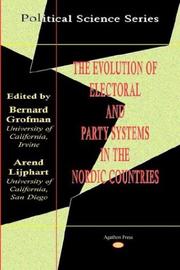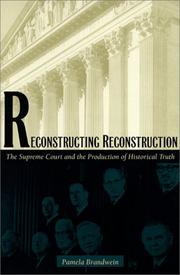| Listing 1 - 10 of 43 | << page >> |
Sort by
|
Book
ISBN: 0511707797 1108010695 Year: 2011 Publisher: Cambridge : Cambridge University Press,
Abstract | Keywords | Export | Availability | Bookmark
 Loading...
Loading...Choose an application
- Reference Manager
- EndNote
- RefWorks (Direct export to RefWorks)
The introduction, during the Middle Ages, of a representative system into English political life, was an event of great historical significance, and has since been central to academic debate. Written by Ludwig Riess (1861-1928), an eminent 20th century historian, this pioneering account of the medieval English electorate profoundly influenced the study of English constitutional history, as it questioned the fundamental assumptions of the scholarship that preceded it. First published in German in 1885, it critically evaluated the aims of the elected representatives, and re-assessed the general electoral regulations of the period. In so doing, it provided new solutions to some problems encountered by previous scholars, such as defining parliamentary boroughs, and accounting for the rise of a national representative assembly. First translated into English in 1940 by K. L. Wood-Legh.
Election law --- Law, Medieval. --- History. --- Medieval law --- Elections --- Electoral law --- Law, Election --- Constitutional law --- Law and legislation
Book
ISBN: 9783944773391 Year: 2022 Publisher: Frankfurt am Main Max Planck Institute for Legal History and Legal Theory
Abstract | Keywords | Export | Availability | Bookmark
 Loading...
Loading...Choose an application
- Reference Manager
- EndNote
- RefWorks (Direct export to RefWorks)
This book examines the process of electoral reform in the Bahamas during the 20th century in the broader context of decolonisation. Beginning with the General Assembly Elections Act of 1919, which reaffirmed a franchise limited to propertied men, milestones include the introduction of voting by secret ballot between 1939 and 1946, universal adult male suffrage in 1959, women's suffrage in 1961, and the incremental abolition of plural voting between 1959 and 1969.
Suffrage --- Election law --- Elections --- Electoral law --- Law, Election --- Constitutional law --- Franchise --- Right to vote --- Voting rights --- Political rights --- Plebiscite --- Representative government and representation --- Voting --- Law and legislation
Book
ISBN: 9085140536 1134290330 1280400285 9786610400287 0203482999 9789085140535 9781134290338 9781280400285 9780203482995 Year: 2006 Publisher: London : Routledge,
Abstract | Keywords | Export | Availability | Bookmark
 Loading...
Loading...Choose an application
- Reference Manager
- EndNote
- RefWorks (Direct export to RefWorks)
There is much intense interest in North Korea at present. This partly arises from questions about Korea's nuclear capability and intentions, and about the extent to which North Korea may be viewed as 'a rogue state' or part of 'the axis of evil'. In addition, however, North Korea has recently begun experimenting with reforms along Chinese lines. The vigour with which these will be pursued, and related questions about the degree of engagement, or otherwise, with South Korea are also important issues. This book provides full details of economic and political developments in North Korea since 198
Korea (North) --- Economic conditions. --- Politics and government. --- Election law --- Voting --- Balloting --- Polls --- Elections --- Politics, Practical --- Social choice --- Suffrage --- Electoral law --- Law, Election --- Constitutional law --- Law and legislation
Book
ISBN: 2130488331 9782130488330 Year: 1998 Volume: 3334 Publisher: Paris : PUF,
Abstract | Keywords | Export | Availability | Bookmark
 Loading...
Loading...Choose an application
- Reference Manager
- EndNote
- RefWorks (Direct export to RefWorks)
Public law. Constitutional law --- France --- Election law --- Contested elections --- Elections --- Droit --- Contestation --- -Elections --- Law, Election --- Constitutional law --- Law and legislation --- -Election law --- Electoral law --- Election law - European Union countries
Book
ISBN: 2802715097 9782802715092 Year: 2001 Volume: *57 Publisher: Bruxelles: Bruylant,
Abstract | Keywords | Export | Availability | Bookmark
 Loading...
Loading...Choose an application
- Reference Manager
- EndNote
- RefWorks (Direct export to RefWorks)
Election law --- Elections --- Congresses --- Droit --- Congrès --- 342.8 --- 314 Kiesrecht --- Kiesrecht --(algemeen) --- 342.8 Kiesrecht --(algemeen) --- Congrès --- Law, Election --- Constitutional law --- Law and legislation --- Congresses. --- Electoral law --- Election law - Belgium - Congresses

ISBN: 0875861687 9780875861685 9780875861395 0875861393 0875861385 0875861393 9780875861388 Year: 2002 Publisher: New York : Agathon Press,
Abstract | Keywords | Export | Availability | Bookmark
 Loading...
Loading...Choose an application
- Reference Manager
- EndNote
- RefWorks (Direct export to RefWorks)
Election law --- Political parties --- Parties, Political --- Party systems, Political --- Political party systems --- Political science --- Divided government --- Intra-party disagreements (Political parties) --- Political conventions --- Elections --- Electoral law --- Law, Election --- Constitutional law --- History. --- Law and legislation

ISBN: 082239779X 0822322846 0822323168 Year: 1999 Publisher: Durham, NC : Duke University Press,
Abstract | Keywords | Export | Availability | Bookmark
 Loading...
Loading...Choose an application
- Reference Manager
- EndNote
- RefWorks (Direct export to RefWorks)
Was slavery over when slaves gained formal emancipation? Was it over when the social, economic, and political situation for African Americans no longer mimicked the conditions of slavery? If the Thirteenth Amendment abolished it in 1865, why did most of the disputed points during the Reconstruction debates of 1866–75 concern issues of slavery? In this book Pamela Brandwein examines the post–Civil War struggle between competing political and legal interpretations of slavery and Reconstruction to reveal how accepted historical truth was established.Delving into the circumstances, assumptions, and rhetoric that shaped the “official” story of Reconstruction, Brandwein describes precisely how a dominant interpretation of events ultimately emerged and what its implications have been for twentieth-century judicial decisions, particularly for Supreme Court rulings on civil rights. While analyzing interpretive disputes about slavery, Brandwein offers a detailed rescoring of post–Civil War legislative and constitutional history, including analysis of the original understanding of the Fourteenth Amendment. She identifies the perspectives on Reconstruction that were endorsed or rejected by the Supreme Court. Explaining what it meant—theoretically and practically—to resolve Reconstruction debates with a particular definition of slavery, Brandwein recounts how the Northern Democratic definition of “ending” slavery was not the only definition, just the one that prevailed. Using a familiar historical moment to do new interpretive work, she outlines a sociology of constitutional law, showing how subjective narrative construction can solidify into opaque institutional memory.
Constitutional history --- Reconstruction (U.S. history, 1865-1877) --- Slavery --- Election law --- Civil rights --- Elections --- Electoral law --- Law, Election --- Constitutional law --- Carpetbag rule (U.S. history, 1865-1877) --- Reconstruction (1865-1877) --- Postwar reconstruction --- History. --- Law and legislation
Book
ISBN: 3789003174 Year: 1977 Publisher: Baden-Baden
Abstract | Keywords | Export | Availability | Bookmark
 Loading...
Loading...Choose an application
- Reference Manager
- EndNote
- RefWorks (Direct export to RefWorks)
Theory of the state --- Election law --- Legislative bodies --- Political parties --- Representative government and representation --- Parliamentary government --- Political representation --- Representation --- Self-government --- Constitutional history --- Constitutional law --- Political science --- Democracy --- Elections --- Republics --- Suffrage --- Bicameralism --- Legislatures --- Parliaments --- Unicameral legislatures --- Estates (Social orders) --- Law, Election --- Law and legislation --- Electoral law
Book
ISBN: 2747564339 9782747564335 Year: 2004 Publisher: Paris: L'Harmattan,
Abstract | Keywords | Export | Availability | Bookmark
 Loading...
Loading...Choose an application
- Reference Manager
- EndNote
- RefWorks (Direct export to RefWorks)
Elections --- Election law --- #SBIB:044.IOS --- #SBIB:324H42 --- Politieke structuren: verkiezingen --- Electoral politics --- Franchise --- Polls --- Law, Election --- Law and legislation --- Political science --- Politics, Practical --- Plebiscite --- Political campaigns --- Representative government and representation --- Electoral law --- Constitutional law --- Elections - European Union countries --- Election law - European Union countries --- Élections --- Système électoral --- Modes de scrutin --- Europe --- Études comparatives --- Élections --- Système électoral --- Études comparatives
Book
ISBN: 9681210042 6076288183 Year: 2001 Publisher: México, D.F. Colegio de México
Abstract | Keywords | Export | Availability | Bookmark
 Loading...
Loading...Choose an application
- Reference Manager
- EndNote
- RefWorks (Direct export to RefWorks)
Uno de los rasgos más notables del sistema político mexicano ha sido el predominio del poder ejecutivo no sólo sobre el legislativo sino también sobre las demás instituciones y prácticas políticas del país. Con frecuencia se ha señalado que ese predominio presidencial había relegado deliberadamente al Congreso a un segundo plano, restándole atribuciones y sometiéndolo a su voluntad. Tal interpretación del funcionamiento de la división de poderes en el sistema político mexicano rara vez fue cuestionado porque la pasividad del poder legislativo era, en muchos aspectos, más que evidente. Sin embargo, conforme el país ha experimentado cambios políticos y los partidos de oposición han obtenido una mayor presencia e influencia en las dos cámaras, el poder legislativo ha tenido también una mayor participación e importancia en la política nacional. El presente libro recoge ensayos que demuestran plenamente que el Congreso, aun cuando estuviera subordinado al ejecutivo federal, fue una institución que influyó en el sistema político.
Public law. Constitutional law --- Mexico --- Representative government and representation --- Election law --- Legislative power --- History --- Mexico. --- Politics and government --- Power, Legislative --- Constitutional law --- Implied powers (Constitutional law) --- Judicial review --- Separation of powers --- Elections --- Law, Election --- Law and legislation --- Electoral law --- Legislative bodies --- Bicameralism --- Legislatures --- Parliaments --- Unicameral legislatures --- Estates (Social orders) --- Biography: general
| Listing 1 - 10 of 43 | << page >> |
Sort by
|

 Search
Search Feedback
Feedback About UniCat
About UniCat  Help
Help News
News